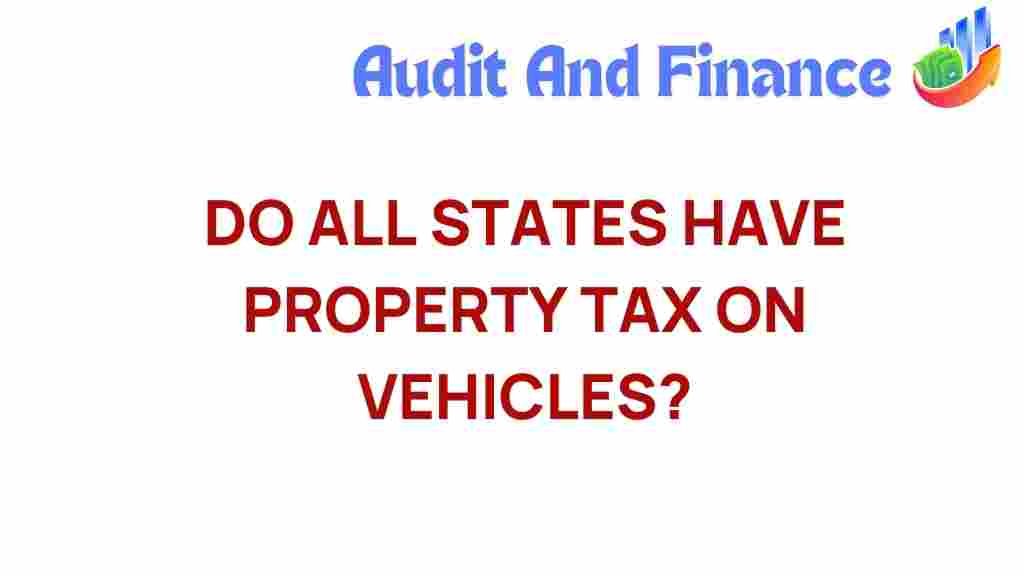Unraveling the Mystery: Do All States Impose Property Tax on Vehicles?
When it comes to vehicle ownership, understanding the associated costs is essential. One of the most significant financial impacts that vehicle owners may face is property tax. But do all states impose property tax on vehicles? This article aims to unravel this mystery by exploring the regulations surrounding property tax on vehicles across different states, the implications of these taxes, and what vehicle owners need to know to navigate the taxation landscape.
What is Property Tax on Vehicles?
Property tax on vehicles, often referred to as auto tax, is a tax levied by state or local governments on the ownership of motor vehicles. This tax is typically assessed based on the vehicle’s value and is paid annually or semi-annually. The rates and regulations can vary significantly from one state to another, making it crucial for vehicle owners to be informed about their specific state’s laws and regulations.
Understanding State Variations in Vehicle Taxation
Not all states impose property tax on vehicles. Some states may charge a nominal fee, while others may have a more extensive taxation system. Here are a few categories to consider:
- States with High Vehicle Property Tax: Some states, such as New Jersey and Virginia, impose higher property taxes on vehicles. Vehicle owners in these states may find their annual tax bills significantly impacting their overall vehicle ownership costs.
- States with Minimal or No Vehicle Property Tax: States like Delaware and Montana do not impose property tax on vehicles, making them more attractive for potential vehicle owners looking to save on costs.
- States with Alternative Vehicle Taxes: Certain states might not have a property tax specifically for vehicles but may impose alternative taxes, such as registration fees or excise taxes based on the vehicle’s value.
How Vehicle Property Tax is Calculated
The calculation of property tax on vehicles can be complex and varies by state. Here are some common factors that influence the calculation:
- Vehicle Value: The assessed value of the vehicle is usually based on its market value or a predetermined valuation schedule.
- Tax Rate: Each state sets its own tax rate, which could be a percentage of the vehicle’s value.
- Local Regulations: Some counties or municipalities may impose additional taxes or fees on vehicles, affecting the total tax owed.
The Financial Impact of Vehicle Property Tax
Understanding the financial impact of property tax on vehicles is essential for budgeting and planning. The tax can significantly add to the overall cost of vehicle ownership. Here are some points to consider:
- Annual Costs: Vehicle property tax can range from a few dollars to several hundred dollars annually, depending on the state and the vehicle’s value.
- Budgeting for Taxes: Vehicle owners should include property tax in their annual vehicle budget to avoid surprises.
- Potential for Increased Costs: As vehicle values rise, property taxes may also increase, leading to higher ownership costs over time.
Navigating State Laws and Regulations
Each state has its unique laws and regulations regarding property tax on vehicles. Here’s a step-by-step process for vehicle owners to navigate these regulations:
Step 1: Research Your State’s Tax Laws
Start by visiting your state’s department of motor vehicles (DMV) or taxation website. Look for information regarding vehicle property tax, including rates, calculation methods, and due dates.
Step 2: Understand Local Regulations
In addition to state laws, local municipalities may impose their own taxes. Check with local tax authorities to ensure you have a comprehensive understanding of the obligations.
Step 3: Gather Necessary Documentation
Prepare all relevant documentation, such as vehicle registration, purchase receipts, and prior tax bills, to assist in the assessment process.
Step 4: Calculate Your Estimated Tax
Using the information gathered, estimate your vehicle property tax based on your state’s tax rate and your vehicle’s assessed value.
Step 5: Plan for Payments
Based on your calculations, budget for your property tax payments to avoid late fees or penalties.
Troubleshooting Common Issues
Vehicle owners may encounter various issues regarding property tax. Here are some troubleshooting tips:
- Discrepancies in Vehicle Value: If you believe your vehicle is assessed at a higher value than it should be, gather evidence and contact your local tax office to dispute the assessment.
- Late Payments: If you’ve missed a payment deadline, contact your local tax authority immediately to discuss potential penalties or payment options.
- Changes in Ownership: If you sell or transfer ownership of your vehicle, ensure that you understand how this affects your tax obligations.
Conclusion
In conclusion, the question of whether all states impose property tax on vehicles is complex and varies significantly across the United States. While some states impose high property taxes on vehicles, others do not charge this tax at all, or they may have alternative taxation methods. Understanding your state’s specific regulations is crucial for effective budgeting and financial planning as a vehicle owner.
For more detailed information on property tax regulations in your state, you can visit your state’s DMV website. Additionally, if you’re interested in learning more about vehicle ownership costs, check out this comprehensive guide on vehicle expenses.
By staying informed and proactive, vehicle owners can navigate the complexities of auto tax and make better financial decisions regarding their vehicle ownership. Whether you live in a state with high property tax or one with low or no tax, knowledge is key to managing your responsibilities effectively.
This article is in the category Taxation and created by AuditAndFinance Team

2 thoughts on “Unraveling the Mystery: Do All States Impose Property Tax on Vehicles?”